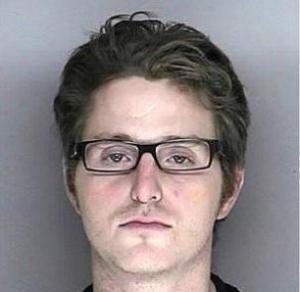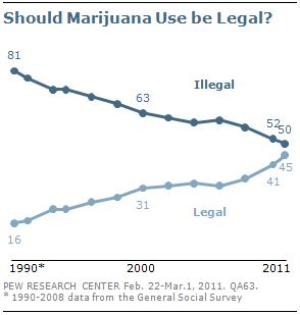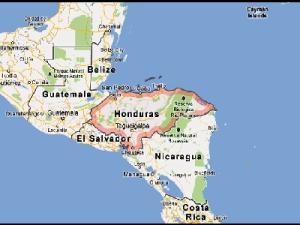Is the Office of the Pardon Attorney, which recommends to the president who should win pardons or commutations, doing its job? The case of Clarence Aaron suggests it is not, and advocates are crying foul.
Two states are already set to vote on marijuana legalization in November, but initiative campaigns are still underway in four others, and it looks like at least one more state will come on board.
A new Rasmussen poll has national support for marijuana legalization and regulation at 56%, up significantly from a poll just two months ago. It's in line with most other recent national polls.
ProCon.org is a set of in-depth web sites presenting information and views from on current issues, several with relevance to drug policy. The Chronicle is currently running a series of info items from ProCon.org -- this one from medicalmarijuana.procon.org -- and we encourage you to check it out.
After Cameron Douglas got caught with heroin and Suboxone in federal prison, he got hammered with an additional 4 1/2 years. That harsh sentence has sparked an effort not only to overturn that sentence, but also to highlight the lack of drug treatment for addicted prisoners.
The Rhode Island governor has finally opened the door to compassion centers, a medical marijuana initiative campaign is getting underway in North Dakota, people are going to federal prison in Montana, and the battles continue in California.
US backing for and involvement in Honduras' war against drug trafficking is under increasing scrutiny after a DEA-involved raid that left four innocent people dead.
The Secret Service Colombia prostitution scandal has now ensnared at least two DEA agents in Cartagena. An investigation is proceeding.
Oklahoma Gov. Mary Fallin (R) has signed a bill that requires welfare applicants to be screened for drug use and drug tested for "reasonable cause." If they test positive, they lose their benefits.
A New Jersey marijuana decriminalization bill has passed its first hurdle, advancing out of the Assembly Judiciary Committee.
Philadelphia pays for police misbehavior, more cops get caught pilfering the evidence, one gets caught helping a heroin dealer, and another goes down hard for helping drug traffickers.
Events and quotes of note from this week's drug policy events of years past.
Sentenced nearly two decades ago to three life prison sentences for his peripheral role in a crack cocaine deal, Clarence Aaron became a poster child for the inequities and harshness of drug war policing and sentencing policies. His case has garnered attention in media outlets from PBS to Fox News, and he was featured in the 1999 PBS documentary "Snitch."

Clarence Aaron
Aaron, then a linebacker at Southern University in Baton Rouge, introduced the brother of a drug supplier to a cocaine dealer he knew from his high school days in Mobile and was present when a nine-pound cocaine deal went down. Despite his tangential involvement, when federal authorities busted the cocaine operation, Aaron ended up with by far the longest sentence of anyone involved, because the other players cooperated with the government and named him as a major player, and because he refused to testify against his friends.
Now, the 43-year-old Alabamian is becoming a poster child for yet another drug war inequity: the failure of the Justice Department's Office of the Pardon Attorney to promptly and accurately report to the president on requests for pardons and commutations.
In a pair of lengthy investigative reports,
the most recent published last Saturday,
ProPublica and the Washington Post revealed that when Aaron tried for commutation for a second time in 2008, Pardon Attorney Ronald Rodgers, who is still in the post, failed to convey critical information about his request to the Bush White House, including recommendations from the US Attorney and his sentencing judge that his application be granted.
"I have reviewed various documents submitted by Clarence Aaron in support of his petition for commutation of sentence and agree that Aaron should receive a commutation of his life sentence," wrote US Attorney for the Southern District of Alabama Deborah Rhodes in her November 2008
memo to Rodgers.
US District Court Judge Charles Butler,
Jr., also shifted from an earlier stance of neutrality on Aaron's request to one of support. "Looking through the prism of hindsight, and considering the many factors argued by the defendant that were not present at the time of his initial sentencing, one can argue that a less harsh sentence might have been more equitable," he wrote in response to a
motion filed by Aaron’s attorneys.
Via a phone interview with the pardon office, Butler told staff attorney Samuel
Morison that Aaron "should be granted relief" immediately by the president.
Morison then sent an e-mail to Rodgers telling him what Butler had said and asking whether he should update Aaron's file with the new positions taken by the judge and the prosecutor. Rodgers responded by saying he would take care of it.
He didn't. Instead, he made no new recommendation to the White House and did not revise Aaron's file to reflect the new stances by the judge and prosecutor. Nor did he pass on years of favorable prison reports describing Aaron's rehabilitation or mention an
affidavit Aaron filed with the pardons office in 2007 in which he expressed further remorse and asked "for a second chance to be a productive citizen."
The Bush administration, acting on the Office of the Pardon Attorney's recommendation, turned down Aaron's commutation request in December 2008.
When
ProPublica showed the statements from the judge and prosecutor to Kenneth Lee, the White House lawyer working on Aaron's case, Lee was mind-boggled. He said that had he seen those statements, he would have recommended a commutation.
"This case was such a close call," Lee said. "We had been
asking the pardons office to reconsider it all year. We made clear we were interested in this case."
Aaron isn't alone in getting sub-par treatment from the pardon office.
ProPublica and the Post cited a former pardon office lawyer as saying some applicants have been turned down "en masse," with little or no review. But it gets worse. The
first ProPublica and Post report on the pardon office, published in December, found that white offenders seeking pardons and commutations were four times more likely to receive them than black ones.
And, as the number of commutation requests has risen along with the prison population, the likelihood of actually winning one has been declining. It was one out of a hundred under Reagan and Clinton, but declined to little more than one out of a thousand under George Bush. President Obama so far has commuted the sentence of one person out of 3,800.
The Office of the Pardon Attorney has been backlogged for much of the last decade, and that may account for some of the problem. When Rodgers took over, he attempted to streamline the office to address the backlog. Instead of having office attorneys review and research each case, he turned them over to paralegals. The result was too often merely a
pro forma review.
"The office types up a list of names, along with basic sentencing and offense information for each prisoner, and sends the list to the White House with a note that says the attached cases are
meritless and should be denied,"
Morison said.
Rodgers reverted back to the old system in 2010, but that was too late for Clarence Aaron and the thousands of others summarily rejected by the pardon office. The apparent problems at the pardon office have sentencing advocates calling for changes.
"We need to see some change on several fronts," said Marc
Mauer, executive director of the
Sentencing Project. "First, the administration needs to look at what's happening or not happening at the Office of the Pardon Attorney, and some of that should include a rethinking of how the pardon process takes place. There are calls for an independent commission to make these recommendations to the president, not an entity within the Justice Department. That's at least worthy of consideration to see what the trade-offs are," he mused.
"Also, the White House should make it clear that to be consistent with its longstanding support or the reform of crack cocaine sentencing, there should be an examination of those older cases currently in prison,"
Mauer added. "They should consider recalculating those mandatory minimum sentences as if they were sentenced today, to put them in sync with the new law. That would not only be consistent, it could have a substantial effect on the federal prison population."
Mauer's first suggestion echoes one made by former Obama White House counsel Gregory Craig, who told an American Constitution Society panel on the pardons issue last week that the president could eliminate the pardon office by executive order. He suggested a bipartisan review panel reporting directly to the president.
"We cannot improve or strengthen the exercise of this power without taking it out of the Department of Justice," Craig said.
Families Against Mandatory Minimums (
FAMM), which has championed Aaron's case as well as many others, called the
ProPublica report "extremely disturbing but not surprising." The organization is calling for a congressional investigation and, on Monday, issued a
sign-on letter to demonstrate public support for the call.
"Between this report and
ProPublica's earlier report on the pardon process, the Pardon Attorney's office has been shown to willfully misrepresent the facts of commutation requests to the President and contribute to a racial imbalance among pardon recipients. The Pardon Attorney's office is not a gatekeeper but a brick wall," said
FAMM president Julie Stewart. "Congress should investigate this egregious behavior immediately with oversight hearings. The entire clemency process should be removed from the Department of Justice's control. It is not in the president or the public's interest to have a Pardon Attorney's office that is captive to a prosecutorial agenda, doesn't take clemency cases seriously, and doesn't treat applicants fairly."
FAMM pointed to other cases it said suggested something was seriously wrong with the pardon office.
"We have long believed that the Pardon Attorney's case evaluations have been subjective and misleading," said Stewart. "Now we know that is true in the case of Clarence Aaron. Many other cases are suspect, too. President Obama denied a commutation to
Barbara Scrivner, a low-level, nonviolent drug offender who has served 16 years of her 30-year sentence for her minor and addiction-driven role in her husband's methamphetamine activity. Did the Pardon Attorney ever inform President Obama of
Scrivner's extraordinary rehabilitation and the support she had from the prosecutors who tried her, the judge who sentenced her, and her congressman? If someone with that much support cannot get a favorable recommendation from the Pardon Attorney, who can?" she asked.
"We learned there have been only 12 commutations in the past 12 years, and only one under this president, and at least one derailed under Bush," said FAMM general counsel Mary Price. "And then there are the problems with the pardons. There is a lot more to investigate. I don't see how lawmakers can come to the conclusion there's not a serious problem. Not only Congress, but the administration and the Justice Department ought to be taking notice of this and acting accordingly."
"The letter sent today demonstrates that this story is not going to go away and that DOJ cannot sweep the Office of the Pardon Attorney's disturbing behavior under the rug," said Stewart.
Whether the Obama administration or the Congress will be moved to act on these latest revelations remains to be seen. Meanwhile, Clarence Aaron sits in federal prison, where he will die if he does not win a commutation. He filed a new application in 2010. That one is still pending.
back to top
As summer draws near, the election picture when it comes to statewide marijuana legalization initiatives is becoming a bit clearer. At the beginning of the year, activists in eight states undertook efforts to get initiatives on the ballot, but the field has been winnowed.
With polling this year starting to show majority support for legalization and regulation, 2012 could be the year that legalization actually wins, and voters in at least two states -- Colorado and Washington -- will have the chance to make that happen. Initiatives in those two states have already been approved for the ballot, and the election campaigns are underway.
Four separate and competing initiatives from a divided marijuana movement came up short in the past few weeks in California, while the
Show Me Cannabis Regulation initiative in Missouri, long on heart but short on funds, gave up the ghost for this year earlier this month. Activists in both states are planning to return to the fray in 2014.
That leaves four states -- Michigan, Montana, Oregon and Nebraska -- where initiatives are still in the signature-gathering phase. Within a few weeks, we will know for sure whether any of them will make it to the ballot in November, but as of this week, Oregon appears best placed to join Colorado and Washington in the fall.
Here's how it's looking in the four states where initiatives are still trying to qualify for the ballot:
Michigan
The
Committee for a Safer Michigan is currently circulating petitions for its
constitutional amendment to repeal marijuana prohibition. The committee has until July 9 to gather the 322,609 valid voter signatures needed to qualify for the November ballot. So far, it has only handed in about 35,000, but organizers say many signature-bearing petitions are still out in the field.
"The number of signatures we have in hand is significantly lower than the real number," said Brandi
Zink, campaign volunteer coordinator. "We have 2500 volunteers out there with petitions."
If each volunteer signature gatherer has only come up with 100 signatures so far, that would be another 250,000, putting the 306,000 valid signatures within reach.
The campaign will make a big push in the final weeks, but desperately needs money,
Zink said.
"We've been reaching out to the political parties here," she said. "We have friends in the Democratic Party and Ron Paul supporters among the Republicans. We are going to be at every major festival and we're still recruiting volunteers, but we still need help and we still need donations. Anyone who would like to give generously to our effort will be most appreciated. We certainly have the will and the boots on the ground. If we had money, we can get this on the ballot and win."
Zink called on drug reformers across the country to chip in.
"We're asking people in the reform movement to please contribute," she said. "If you're not in Michigan, this is how you can make a difference here. What we're doing in the Midwest can have an impact throughout the nation."
Montana
Montana First, the same group of activists and supporters who last summer and fall organized
the successful signature-gathering campaign to put the
IR-124 medical marijuana initiative on the November 2012 ballot to undo the legislature's destruction of the state medical marijuana distribution network, is also working on a legalization initiative,
Constitutional Initiative No.110 (CI-110).
It would add two sentences to the state constitution: "Adults have the right to responsibly purchase, consume, produce, and possess marijuana, subject to reasonable limitations, regulations, and taxation. Except for actions that endanger minors, children, or public safety, no criminal offense or penalty of this state shall apply to such activities."
To qualify for the ballot, campaigners need to gather some 45,000 valid voter signatures, and Montana law also requires that those signatures include 10% of voters in at least 40 of 100 of the state's electoral districts. They have until June 22, and they're less than halfway there, but still holding out hope.
"We're making a serious run, and we have one month left. We're behind on our goals, but we're accelerating rapidly, and that gives me some cause for optimism," said Montana First's John Masterson. "We have about 20,000 signatures so far and we're gearing up for primary day on June 5. If we do everything right on that day we could double what we have," he said.
"We've got a small army of signature-gatherers on the street, and we have some paid signature-gatherers, too," Masterson said. "People are coming out from under their rocks despite the federal raids, despite the radical acts of the legislature, despite their fears. They are saying they have to stand up and fight for the right of adults to use cannabis in responsible ways."
Nebraska
The
Nebraska Prop 19 2012 Cannabis Initiative would amend the state constitution so that any law regarding the private, non-commercial cultivation and consumption of marijuana would be forbidden, with the legislature directed to enact regulations for commercial sales and cultivation. Any current laws violating the amendment, such as the current marijuana laws, are declared null and void and convictions for violations of them are set aside.
In addition to the web site above, the campaign has a Facebook petition page and has shown some signs of life, holding events in Lincoln and Omaha, but has otherwise been remarkably stealthy. While the initiative was filed by McCook attorney Frank Shoemaker, the signature-gathering campaign has reportedly been taken on by the Nebraska Cannabis Alliance.
We have no reliable reports of far the campaign has progressed, but it needs just under 50,000 signatures to make the November ballot and has until July to do so.
Oregon
In Oregon, two separate initiatives appear poised to make the ballot with six weeks left to gather signatures. The Oregon Cannabis Tax Act (OCTA) initiative, which would allow for the legal cultivation and sale of marijuana, needs 87,213 valid signatures to make the ballot. The Oregon Marijuana Policy Initiative constitutional amendment, which would give adult Oregonians the constitutional right to possess marijuana, has to reach a higher threshold of 116,284.
Both measures have until July 6 to turn in signatures, but also face a Friday deadline for turning in enough signatures to qualify for early verification by the secretary of state's office. The early verification allows campaigns to know whether they have come up short because of invalid signatures and gives them six weeks to make up the difference. Both initiatives appear well-placed to do so.
"As of Sunday, we had 109,000 signatures in hand," said Paul Stanford, the primary force behind OCTA. "That's 127% of the total. Assuming an invalidation rate of 30% to 35%, we need to turn in 132,000 to 136,000. We're getting about 10,000 a week, and we have six and a half weeks left," he said.
Stanford has largely funded the OCTA campaign through his multi-state chain of medical marijuana clinics -- not dispensaries -- and said he had pumped $60,000 of his money into the campaign this month.
"We need 116,300 signatures turned in for early approval, and we currently have 132,000," said Robert Wolfe, proponent for OMPI. "We are going to make the ballot, no question about it. The secretary of state will disqualify some percentage, so we're aiming for 185,000 and we'll be collecting up until the deadline."
Both men said that in the event both measures made the ballot, they would complement -- not contradict -- each other.
"The OMPI is a constitutional amendment that requires that the state regulate cannabis, and our OCTA initiative would fulfill that regulatory requirement and save the legislature from contentious debate," said Stanford.
While Wolfe agreed that the two measures could complement each other, he also expressed concerns about mixed messaging.
"There is a difference in the messaging," he said. "We've been careful to frame this as an issue of social justice and wasted resources, while a lot of the OCTA supporters have a more strident marijuana lifestyle message. Those aren't the voters we're trying to attract. We can't win an election with hardcore cannabis supporters alone; we have to appeal to mainstream voters by talking about things they think are important."
Still, having two marijuana legalization initiatives on the ballot is the kind of problem activists in other states wish they had.
What happened to California?
While the failure of the Missouri initiative to make the ballot was not a huge surprise -- it faced big obstacles in the south-central state -- the failure of an initiative to make the ballot in California was a surprise and a disappointment to many reformers, especially after the state came so close with Proposition 19 in 2010.
But the failure of Prop 19, along with the conflicts over medical marijuana, may have sealed the fate of initiative efforts in the Golden State this year, said long-time California scene-watcher and CANORML head Dale Gieringer.
"We just voted on this, and people didn't quite buy it," he said, referring to the Prop 19 defeat. "And the polling hadn't moved. We have a fair amount of chaos in our medical marijuana system, and as long as California voters don't have the confidence we can regulate medical marijuana well, I think they're reluctant to open the doors to further chaos with legalization."
The ongoing federal crackdown on medical marijuana wasn't helping, either, he added.
The failure in 2010 also scared off big money funders, said Gieringer, who estimated it would cost a million dollars just to make the ballot.
"There wasn't the money to do it. We tried in 2010, and it's hard to come back two elections in a row," he said. "Since the polls hadn't moved, the funders weren't terribly interested and thought they could get better bang for their buck in Colorado and Washington and maybe Oregon."
Although there were four separate initiatives, he said, "You add up all the funding for all the initiatives, and it's just not very much. Even if there had been only one initiative, it wouldn't have had a chance."
California led the way with medical marijuana in 1996 and with Proposition 19 in 2010, but if activists in Colorado, Washington, and maybe Oregon, Montana, Michigan, or Nebraska have their way, it will not be the first state to legalize marijuana.
back to top
A Rasmussen poll of likely voters released Tuesday found support for legalizing and regulating marijuana at 56% nationwide, a significant increase over a March Rasmussen poll and in line with other recent polls that show legalizing gaining majority support and trending upward.
The poll comes ahead of elections in November that will see votes in at least two states, Colorado and Washington, vote on marijuana legalization initiatives. Efforts are still underway to get on the ballot in four other states -- Michigan, Montana, Nebraska, and Oregon. The poll did not break down support by state.
Legalization garnered majority support among both sexes and across age groups, although with some significant differences. While 61% of men supported "legalizing marijuana and treating it like alcohol or cigarettes," only 52% of women did, reflecting a gender gap apparent in other polls. And while even seniors came in with 50% support, only 49% of respondents with minor children supported legalization.
Support in that demographic jumped, however, when pollsters asked if they would favor legalization "if no one under 18 could buy it, it was banned in public, and there were strict penalties for driving under the influence." Under those conditions, support among parents jumped to 58% and support among Republicans increased to 52%, bumping up overall support for legalization one point to 57%.
The poll also asked whether it should not be a crime "for someone to smoke marijuana" in private. Only 32% agreed that private pot-smoking should remain a crime, while 68% disagreed.
The
same poll asked whether US drug consumption is a major cause of drug violence in Mexico and Central America, with 62% agreeing that it is. More surprisingly, 47% said they agreed with legalizing marijuana
and cocaine if it would reduce the violence along the Mexican border. But in another question in the poll, only 11% agreed with legalizing and regulating cocaine.
The poll sampled 1,000 likely voters. It has a margin of error of +/- 3%.
back to top
Did you know that marijuana's documented history as a medicine dates back to 2900 BC? Read about it in Historical Timeline -- History of Marijuana as Medicine - 2900 BC to Present, on http://medicalmarijuana.procon.org, part of the ProCon.org family.
Follow Drug War Chronicle for more important facts from ProCon.org over the next few weeks, or sign up for ProCon.org's email list or RSS feed. Click here for last week's Chronicle Did You Know segment.
ProCon.org is a web site promoting critical thinking, education, and informed citizenship by presenting controversial issues in a straightforward, nonpartisan primarily pro-con format.

back to top
Cameron Douglas, the son of noted Hollywood actor Mike Douglas, had a well-known history of drug addiction when he was sentenced to five years in federal prison for heroin possession and drug distribution. Not offered drug treatment, Douglas relapsed while in prison and was caught in possession of a small amount of heroin and Suboxone.

Cameron Douglas
Most federal prisoners caught with small amounts of drugs are dealt with administratively, and that happened to Douglas. He spent 11 months in solitary confinement and was denied visits during that period for his transgression.
But, unusually, Douglas was also prosecuted for drug possession by a prisoner, and even more unusually, he was hammered hard at sentencing. Federal District Court Judge Richard Berman nearly doubled his original drug trafficking time, sentencing him to an additional 4 ½ years in prison. Prosecutors had asked for at most an additional two years.
In imposing the harsh sentence, Judge Berman said that Douglas was "continuously reckless, disruptive, and
noncompliant" and had repeatedly refused to obey the law.
The
draconian sentence for Douglas has sparked a reaction. Unlike most federal prisoners, thanks to his father, Douglas had the resources to appeal his sentence, which is possibly the longest in federal prison history for simple drug possession behind bars. And now that appeal has been joined by about two dozen addiction and drug treatment doctors and organizations who have signed an
amicus curiae brief on his behalf.
The brief does not just argue that Douglas should be sentenced more leniently; it argues that Douglas is a classic example "of someone suffering from untreated
opioid dependence" and that more prison time will do nothing to address his addiction. The brief shows that many federal prisoners suffer from drug addictions, that many fail to get any meaningful treatment for it in prison, and argues that imposing additional incarceration for drug-addicted prisoners serves no
penological purpose.
"A central theme of the [brief] is the need to provide effective, evidence-based treatment to
opioid-dependent persons, particularly to those under criminal justice supervision. Time and again, over the past four decades, the provision of appropriate substance abuse treatment to
opioid-dependent persons has been shown to profoundly improve not only their health and well-being across a broad range of metrics, but also the health and safety of the larger public. This is especially true of methadone and other
opioid substitution treatments," the brief argued.
"Conversely, [we] are acutely aware of the ramifications when such treatment is withheld -- the suffering, disease, death, and criminal behavior that result when punitive sanctions replace proven medical interventions and
opioid dependence is left to fester," the addiction specialists argued.
The brief was written by Dan
Abrahamson, director of legal affairs for the
Drug Policy Alliance, which organized the effort to intervene in the Douglas case. Its signatories include the New York and California Societies of Addiction Medicine, as well as other medical, public health and human rights organizations, along with prominent individual physicians and substance abuse researchers.
"Tacking on more prison time for a person who is addicted to drugs because they relapse behind bars goes against fundamental principles of medicine, inflicts unnecessary suffering and undermines both safety and health," said
Abrahamson. "Such a response only fuels the vicious cycle we see daily across the country of drug-dependent persons being imprisoned while sick, coming out sicker, and then returning to jail even quicker -- at huge expense to everyone."
Most federal prisoners don't have the resources or the celebrity of Cameron Douglas, but many share his struggles with addiction. Justice for Cameron Douglas could help lead to more just treatment for them, as well.
back to top
The Rhode Island governor has finally opened the door to compassion centers, a medical marijuana initiative campaign is getting underway in North Dakota, people are going to federal prison in Montana, and the battles continue in California. Let's get to it:
California
Last Wednesday,
Fresno police said they would shut down a newly opened dispensary. The California Herbal Relief Center opened quietly and said "a loophole" in the city code allowed it to circumvent the city's ordinance against dispensaries, but Fresno police were having none of it. The department has sent the operator a "hand delivered note that he needs to stop doing what he is doing," a police spokesman said.
On Saturday, Sunday, and Monday,
advocates held a three-day unity event in Sacramento to rally support for state-regulated medical marijuana industry. About 200 people turned out Saturday to rally for a bill sponsored by Assemblyman Tom
Ammiano (D-San Francisco) that would do just that. On Monday,
reformers took to the capitol to lobby for the bill, Assembly Bill 2312.
On Monday,
a federal appeals court ruled that cities do not violate the rights of the disabled when they ban dispensaries. A three-judge panel of the US
9th Circuit Court of Appeals in San Francisco rejected a claim by patients from Costa Mesa and Lake Forest that those cities' efforts to close dispensaries violated the Americans with Disabilities Act. The law does not protect the use of drugs banned by the federal government, the court held.
Also on Monday,
the LA branch of the NORML Women's Alliance launched a voter education project aimed at identifying favorable (or unfavorable) candidates Los Angeles County Superior Court Judge in the June 5 primary election. Candidates for Superior Court Judge in Los Angeles County are being asked their positions on issues relating to medical marijuana, as well as three-strikes laws, mandatory minimum sentencing and the recent United States Supreme Court mandate to end overcrowding in California prisons.
Also on Monday,
Tulare County filed suit against five collective members for growing medical marijuana in the wrong place. The lawsuit asserts that they are violating the county's land use ordinance by growing marijuana in a rural area near Cutler in northern
Tulare County zoned exclusively for agriculture. Under the county's ordinance, medical marijuana collectives and cooperatives must operate in a commercial or manufacturing zone. This is not the first time
Tulare County has sued medical marijuana growers. In 2009, the county sued Foothill Growers Association for growing marijuana in a building on agricultural property near
Ivanhoe and cited the same ordinance. The collective put up a court fight but lost.
On Tuesday,
Novato's last remaining dispensary announced it was closing. The Green Door Wellness Education Center will shut its doors June 15. It had been open since April 2010. The city has a moratorium on dispensaries, and the second-to-the-last one, the Green Tiger, closed in April under federal pressure.
Also on Tuesday,
an attorney filed a suit to block Nevada County from enforcing an emergency marijuana cultivation ordinance it passed earlier this month. Attorney Jeffrey Lake is seeking a temporary restraining order on behalf of Americans for Safe Access Nevada County, Grassroots Solutions and Patricia Smith, who is the founder of the nonprofit patient advocacy group and the
ASA chapter.
On Wednesday,
Imperial Beach initiative campaigners announced they had gathered more than 2,000 signatures in less than two months for a municipal initiative to repeal a ban on dispensaries and replace it with reasonable regulations.
Canvass for a Cause, a San Diego based nonprofit with the largest gay rights field program in the county, has partnered with
San Diego Americans for Safe Access, a local chapter of the nation’s largest medical marijuana patients’ rights advocacy group on this campaign. They will hand in signatures to the city clerk on Saturday.
Maine
Last week,
a medical marijuana clinic opened in Brewer. It is operated by Wellness Connection of Maine.
Massachusetts
Last Wednesday,
the Massachusetts Prevention Alliance filed a lawsuit challenging the language in a likely ballot initiative to legalize medical marijuana. The lawsuit argues that the language is "misleading" and the initiative has "radical components." Attorney General Martha
Coakley's office has already certified the ballot initiative titled, "An Act for the Humanitarian Use of Medical Marijuana." Proponents of the initiative must now collect 11,485 signatures by early July to get the initiative on the November ballot.
Over the weekend,
the Massachusetts Medical Society approved a resolution opposing the legalization of medical marijuana without further scientific study. It did, however, pass another resolution calling on the DEA to reclassify marijuana to permit more studies.
Michigan
On Tuesday, the
Marijuana Policy Project warned that more bad bills are coming in the state Senate. The bills would dramatically undermine the state's medical marijuana law, the group said, and it urged
Michiganders to contact their senators.
MontanaOn Monday, a Kalispell landlord was sentenced to a year in federal prison for renting a property to a medical marijuana business. Jonathan Janetski pleaded guilty to maintaining a drug involved premises, but he said he had no ties to the growing operation. The prosecution said Janetski wasn't just a landlord, that he didn't take money for rent for a year, and that he was an equal partner.
North Dakota
On Tuesday, a medical marijuana initiative campaign got underway. Rep. Steve Zaiser (D-Fargo) turned the proposed law in to the secretary of state's office for its approval, which is needed before signature-gathering can commence. The proposed law says someone with a "debilitating medical condition" may grow and use marijuana, and possess up to 2 ½ ounces of the drug. It says people with cancer, the HIV virus, post-traumatic stress disorder and other conditions may use marijuana legally.
Rhode Island
On Tuesday night, Gov. Lincoln Chafee (I) signed the bill allowing compassion centers to open. Championed by Sen. Rhoda Perry and Rep. Scott Slater, the bill was crafted to allay the governor's concerns, which had caused him to block them from opening more than a year ago. The amended law only allows centers to possess 1,500 ounces at one time and they can have no more than 99 mature plants at one time. Patients and caregivers will be able to sell any excess medical marijuana they produce directly to the centers as well.
(This article was published by StoptheDrugWar.org's lobbying arm, the Drug Reform Coordination Network, which also shares the cost of maintaining this web site. DRCNet Foundation takes no positions on candidates for public office, in compliance with section 501(c)(3) of the Internal Revenue Code, and does not pay for reporting that could be interpreted or misinterpreted as doing so.)
back to top
In the Honduran village where four residents were killed last week by gunfire from a helicopter on a US-backed anti-drug operation complete with DEA agents on board the chopper, feelings continue to run high. On Monday, they told the Associated Press that DEA agents also accompanied Honduran commandos who stormed into homes and mistreated residents after the raid, but the agency denies that.
In the predawn hours of May 11, Honduran National Police and DEA agents were searching for a boat supposedly carrying a load of cocaine when they said they came under fire from the river. The Hondurans opened fire, but the boat they attacked was a small fishing vessel, not a smuggling craft, and the attack left two pregnant women and two others dead and four other people wounded.
The helicopter is owned by the US State Department and was one of four being used in the operation, which had already resulted in the seizure of cocaine from the banks of the river. Police on the ground and the door-gunner for one helicopter opened up on the boat.
The DEA said its agents did not open fire and did not participate in heavy-handed raids in the immediate aftermath. But villagers in the town of
Ahuas said masked agents then landed in their community and broke down doors, looking for a trafficker they called "El
Renco." The witnesses referred to some of the agents as "gringos" and said they were speaking English.
After the commandos left, angry villagers formed a machete-wielding mob and burned government installations and four homes belonging to families associated with El
Renco. Police Chief
Filiberto Pravia Rodriguez said he tried to stop the mob, but had to run for his life.
The incident comes as the US is ramping up its support of Honduran anti-drug efforts. The Obama administration is increasing the amount of anti-drug assistance and is
working with the Honduran military to create forward operating bases to fight the cocaine traffic from Colombia en route to North America.
Human Rights watch has
called for an investigation into the killings.
"It is critical that both Honduran and US authorities ensure that the killings are thoroughly investigated to determine whether the use of lethal force was justified," said Jose Miguel
Vivanco, Americas director for the group. "If evidence demonstrates that security forces violated international standards, they must be held accountable."
At least one congressman, Rep. Howard Berman (D-CA) is calling for a review of US military assistance to Honduras, where the Honduran military took part in a coup in 2009 and where continuing human rights violations are alleged to be taking place.
"I have consistently expressed deep concerns regarding the danger of pouring US security assistance into a situation where Honduran security forces are involved in serious human rights violations," he told
National Public Radio last week. "The problems are getting worse, not better, making such a review all the more urgent."
Local leaders aren't waiting for investigations or reviews. They want the DEA out now.
"For centuries we have been a peaceful people who live in harmony with nature, but today we declared these Americans to be persona non
grata in our territory," the leaders of five indigenous groups said in a press statement last week picked up by the AP.
back to top
First it was Secret Service agents and members of the military who were part of President Obama's security detail during his trip to the Summit of the Americas in Cartagena, Colombia, last month. Now, allegations of dalliances with prostitutes there have spread to the DEA.
The Justice Department's Office of the Inspector General is investigating possible misconduct by at least two DEA agents, federal officials told the
Associated Press Monday.
ABC News reported the same day that at least three agents are involved.
The alleged misconduct is unrelated to the Secret Service scandal, but evidence of it developed as the Secret Service investigated. The DEA said it was making its employees available to be interviewed by investigators.
"The Drug Enforcement Administration was provided information from the Secret Service unrelated to the Cartagena hotel Secret Service incident, which DEA immediately followed up on, making DEA employees available to be interviewed by the Department of Justice's Office of Inspector General," a DEA spokesperson said in a statement. "DEA takes allegations of misconduct very seriously and will take appropriate personnel action, if warranted, upon the conclusion of the
OIG investigation," the statement said.
Sen. Susan Collins, ranking Republican on the Senate Homeland Security and Government Affairs Committee said in a
statement Tuesday that she had been informed of the allegations against the DEA agents on May 4, but had been asked to stay quiet until the agents involved could be returned to the US and questioned.
"It's disturbing that we may be uncovering a troubling culture that spans more than one law enforcement agency," Collins said. "In addition to the Secret Service scandal, we now learn that at least two DEA agents apparently entertained female foreign national masseuses in the Cartagena apartment of one of the agents. The evidence uncovered thus far indicates that this likely was not just a one-time incident."
Twelve Secret Service agents have been fired or disciplined in the prostitution scandal, and 12 military personnel have also been implicated. Whether any DEA agents will take a fall remains to be seen.
back to top
Oklahoma Gov. Mary Fallin (R) last Wednesday signed into law a bill, House Bill 2388, that requires welfare applicants to be screened for possible drug use and drug tested upon suspicion they are using. They would be denied benefits if they test positive. The screening requirement is designed to surmount constitutional objections to mandatory, suspicionless drug testing of public benefits applicants and recipients.

Oklahoma Gov. Mary Fallin (wikimedia.org)
In the past two years, two states, Florida and Georgia, have passed laws requiring mandatory,
suspicionless drug testing of welfare applicants. The Florida law has been blocked by a federal judge's temporary order as she considers whether to declare it an unconstitutional violation of the Fourth Amendments proscription against warrantless searches. Civil liberties and civil rights advocates in Georgia have vowed similar action against the law there when it goes into effect July 1. An earlier Michigan attempt to impose
suspicionless drug testing of welfare recipients was found unconstitutional by a divided federal appeals court it 2003. That ruling was not appealed.
Several other states have passed public benefits drug testing laws with a screening process to create "reasonable suspicion" that a given individual might be a drug user. Those include Arizona and Missouri last year and Utah and Tennessee this year. The Tennessee bill has yet to be signed by the governor, but he has said he will do so. None of these state laws have yet faced legal challenges.
The Oklahoma law takes effect November 1 and is aimed at adults applying for the Temporary Assistance to Needy Families (
TANF) program. Applicants who refuse to take the drug test or who test positive will be denied benefits. Applicants who test positive and then undergo a drug treatment program -- at their own expense -- can reapply for benefits after six months.
Child-only cases and cases where the parent is underage would not have to be drug tested. If a parent is denied benefits, the bill allows for payments to be made to an alternative payee.
Under an amendment passed in the Senate, the state will pay for the cost of drug testing. The bill originally called for applicants to pick up the tab.
"House Bill 2388 will help ensure welfare checks are not being used to pay for drugs. Hard working taxpayers shouldn't be asked to subsidize drug abuse, and this bill will help to ensure they are not,"
Fallin said in a
signing statement.
"Additionally,
HB 2388 helps to preserve the mission of state-funded welfare -- to provide a social safety net helping the unemployed and needy get back on their feet, find work and support their families," the Republican governor continued. "Unfortunately, drug abuse prevents many recipients of welfare from achieving any of these goals. Drug addiction and illegal drug use contribute to child abuse and child neglect. They also make it difficult to find and hold a job. For all these reasons it is important for drug users and those with substance abuse problems to seek treatment rather than simply being handed a check from Oklahoma taxpayers."
Oklahoma Democrats opposed the bill, with Sen. Jim Wilson (
D-Tahlequah) calling it "poor policy" and "mean-spirited" during earlier debates, and Sen. Tom
Ivester (
D-Sayre) questioning why only one population that receives state assistance should be subjected to drug testing. But their Republican colleagues weren't listening.
back to top
A bill that would decriminalize the possession of up to 15 grams (a little more than a half-ounce) of marijuana was approved Monday by the Assembly Judiciary Committee. The bill, Assembly Bill 1465, now heads for an Assembly floor vote.
Under current law, small-time pot possession is punishable by up to six months in jail. Under AB 1465, the threat of jail would be removed and infractions would be punishable by a $150 fine for a first offense, $200 for a second offense, and $500 for a third offense.
Some 22,000 people were arrested for simple marijuana possession in the state last year, with blacks disproportionately represented. In addition to possible jail time, those arrested face other collateral consequences, such as difficulties finding a job or qualifying for housing.
The crowd in the hearing room and most witnesses, including a retired corrections officer, defense attorneys, a clergyman, a college instructor, and a representative from a drug addiction prevention group favored decriminalization, according to an account carried by
New Jersey Real-Time News.
"Some acts harm society and they warrant the intervention of police, prosecutors and perhaps even incarceration," said the bill's prime Republican sponsor, Michael Patrick Carroll (R-Morris), who is also a committee member. "Other acts warrant at best, a spanking, and these seems to be one of these situations."
"These long-term consequences are unjust and expensive," said Candice Singer, a research analyst from the New Jersey chapter of the National Council on Alcoholism and Drug Dependence. "The police manpower utilized for these arrests is costly. It is beyond dispute that a criminal record interferes with one's ability to maintain employment. This not only hurts the individual and the individual's family, but it harms the economy and the state, preventing residents from becoming employed and paying income taxes."
Only Bruce Hummer of the New Jersey Prevention Network, which represents treatment professionals, spoke against the bill. He said decriminalization would "send a mixed message to our youth," who would be more likely to use the herb if it was seen as less harmful and "accepted" by the community.
But retired corrections officer Harry
Camisa had a powerful retort to Hummer. "I have seen firsthand the devastating effects on these young kids who are sent to jail for what I consider a minor offense,"
Camisa said. "I always felt bad for the very young ones because by the time they asked for protective custody they had already been beaten with a lock in a sock, stabbed or sodomized."
Forty years ago, the Shafer Commission, recognizing that harsh penalties for marijuana had no scientific basis, called for the decriminalization of possession of small amounts for personal use. A handful of states took that advice in the
1970s, and after a long interregnum beginning with the Reagan years, in the past decade, more states have come on board. The number is now 14.
back to top
Philadelphia pays for police misbehavior, more cops get caught pilfering the evidence, one gets caught helping a heroin dealer, and another goes down hard for helping drug traffickers. Let's get to it:
In Philadelphia,
the city has quietly settled 21 lawsuits filed by shop owners after members of the Narcotics Field Unit stole cash and merchandise when ostensibly raiding the places in search of small plastic bags used to sell drugs. The unit's actions exploded into a major scandal in 2009 when a security camera unit members thought they had disabled recorded their actions on a computer hard drive. The result was an FBI investigation of the officers, dropped charges against some defendants, and numerous federal civil right lawsuits filed by people who said they were abused or framed by the squad. The 21 who have settled so far have received an average pay out of $40,000. No officers have yet been charged, but the FBI continues to investigate.
In Baltimore,
a Baltimore police sergeant was arrested last Wednesday on charges he made up information to obtain a drug search warrant.
Sgt. Dennis
Workley, a 16-year veteran of the force, is charged with perjury and misconduct over a December drug raid. Baltimore police investigated after receiving a citizen's complaint, and it is alleged discrepancies in his warrant application for that raid showed he "cut and pasted" text from another case.
Workley has been suspended.
In
Hatboro, Pennsylvania,
a former Hatboro police detective-sergeant was arrested last Thursday on charges he stole guns, drugs, and cash from the department evidence room and used a police informant to buy drugs for him. John Becker, 42, was the evidence room custodian and is accused of stealing 10 guns between 2003 and 2011, along with $18,000 in cash, and more than $2,000 in drugs. Prosecutors said it was to feed his opiate pain pill habit, and that he also "convinced or coerced several individuals to make numerous drug purchases on his behalf, including powerful prescription pain medications such as
OxyContin and Percocet, along with cocaine" under the pretense that he was doing undercover drug investigations. Numerous items missing from the evidence room were found during a search of his home last year. He faces numerous charges.
In
Suffield, Connecticut,
a Suffield police officer was arrested last Friday for stealing cash from a drug bust. Jeremy
DePietro was the arresting officer in a March 2011 call where officers found narcotics and $332 in cash. After the case was disposed of, the court ordered the drugs destroyed and the cash placed in the court's general fund, but the cash was gone. An investigation pointed to
DePietro. He is now charged with tampering with evidence and sixth degree larceny. He was also fired. He is out on $24,000 bond.
In New York City
, a Queens-based NYPD officer was arrested Tuesday on charge he used his position to gain access to sensitive computer records and pass them on to a convicted heroin dealer. Officer Devon Daniels, 30, went down in a DEA investigation that included wiretaps after agents found evidence he used an NYPD database to look up license plate numbers and check the status of criminal warrants for heroin traffickers in Jamaica, Queens. He is heard on wiretaps asking the dealer for money, "any working revolver," and the use of one of his cars. On one occasion, while driving the dealer's car, he stopped at the scene of an arrest of one of the dealer's crew, quizzed police about what was going on, and immediately reported back to the dealer. He has not yet been formally charged and is out on $150,000 bond awaiting arraignment.
In Carlsbad, California,
a Carlsbad police officer pleaded guilty last Thursday to stealing heroin from the department evidence room. Officer Michael Koch, 44, was arrested in January after two employees saw him stealing the dope. Prosecutors said Koch was strung out and stole the drugs for personal use. He entered rehab after being arrested. He will be sentenced June 20 and is expected to receive probation. In the meantime, he's still collecting his $86,000 annual salary while a departmental internal investigation continues.
In San Juan, Puerto Rico,
a former Arecibo police officer was sentenced last Friday to 24 years in federal prison for his role in a drug ring. David Gonzalez-Perez was indicted with 16 other people in a 70-count drug trafficking indictment in September 2010 and was found guilty of 28 counts of conspiracy and attempt to possess with intent to distribute cocaine after a two-week trial in August 2011. He participated in 15 drug transactions, which totaled over 200 kilograms of cocaine and received $36,000 in payments for his security services during the drug transactions. He also recruited 15 others to provide armed security with him during these drug transactions, including his brother and sister-in-law.
back to top
May 27, 1963: President Nathan M. Pusey of Harvard University announces that an assistant professor of clinical psychology and education has been fired. The man dismissed was Dr. Richard Alpert, later known as "Ram Dass."
May 29, 1969: The Canadian government forms the Commission of Inquiry into the Non-Medical use of Drugs, which ultimately issues the famed
LeDain report, recommending that simple possession of cannabis and cultivation for personal use be permitted. The report contradicts almost all of the common fallacies held by some of the general public. During an interview in 1998,
LeDain blames politicians for the fact that virtually none of the commission's recommendations were made into law.
May 26, 1971: In tapes revealed long after his presidency ended, President Richard M. Nixon says, "You know it's a funny thing, every one of the bastards that are out for legalizing marijuana is Jewish. What the Christ is the matter with the Jews, Bob, what is the matter with them? I suppose it's because most of them are psychiatrists, you know, there's so many, all the greatest psychiatrists are Jewish."
May 25, 1973: The NBC Evening News reports that 28 marines and 18 sailors handling the president's yacht were transferred and reassigned from Camp David due to marijuana offenses.
May 30, 1977: Newsweek runs a story on cocaine reporting that "Among hostesses in the smart sets of Los Angeles and New York, a little cocaine, like Dom
Perignon and Beluga caviar, is now de
rigueur at dinners. Some party givers pass it around along with
canapes on silver trays... the user experiences a feeling of potency, of confidence, of energy."
May 24, 1988: The domestic hashish seizure record is set (still in effect today) -- 75,066 pounds in San Francisco, California.
May 24, 1993: At 3:
45pm, Juan Jesus Cardinal
Posados Ocampo, the archbishop of Guadalajara, is assassinated at Hidalgo International Airport in Guadalajara by San Diego gang members hired by the
Arellano-Felix Organization. As the archbishop's car arrives in the parking lot across the street from the terminal, a young man opens the door and opens fire, while half a dozen other gunmen spray the scene killing the driver and five bystanders, including an old woman, her nephew and a startled businessman with a cell phone in his hand.
May 28, 1994: President Clinton's appointed director of the Drug Enforcement Administration, Thomas Constantine, says in a Washington Times interview: "Many times people talk about the nonviolent drug offender. That is a rare species. There is not some sterile drug type not involved in violence -- there is no drug user who is contributing some good to the community -- they are contributing nothing but evil."
back to top











